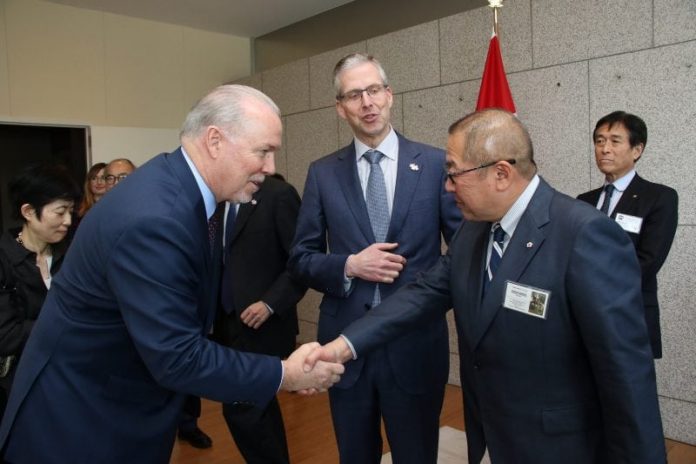
TECHNOLOGY, energy and natural resources were the focus of the Government of British Columbia’s mission to Japan.
As part of this government’s first mission to Asia, the Province aimed to strengthen ties and pave the way for expanded trade and investment opportunities for B.C. businesses.
“Japan is a key market for B.C. wood products, and an important market for the province’s natural resources,” said Premier John Horgan. “Building relationships with the Japanese government and some of Japan’s largest companies that have natural resource interests in B.C. is critical to expanding markets for key job-creating sectors and attracting investment to our province.”
During the two-day visit to Tokyo, the B.C. delegation hosted a natural resources roundtable with Japanese companies to discuss investment in B.C. projects. Horgan held meetings with key government representatives to advance bilateral co-operation in the energy sector and international trade and investment.
Horgan toured Astomos Energy Corporation of Japan’s Liquefied Petroleum Gas (LPG) facility. In 2017, Astomos entered into an LPG purchase agreement with AltaGas, to be delivered through the Ridley Island Propane Export Terminal currently under construction near Prince Rupert. Once operational, the facility is expected to provide 40 to 50 permanent jobs.
The delegation, which included Minister of Jobs, Trade and Technology Bruce Ralston and Minister of State for Trade George Chow, met with technology leaders Fujitsu and SEGA to promote investment in B.C. and partnerships with B.C. tech companies in information communications technology (ICT), wireless, quantum computing, and digital gaming and entertainment.
“With some of the world’s largest tech and IT companies, Japan’s growing investment in B.C. is a show of confidence in our tech sector and economy,” said Ralston. “Our research infrastructure, deep talent pool and culturally diverse population are a magnet for tech investment.”
“Solidifying our relationships with Japanese government agencies and tech companies is an important part of our growth strategy in this sector,” said Chow. “We look forward to continuing discussions with many of our valued tech stakeholders at the BC Tech Summit in Vancouver next May.”
Horgan also gave a keynote speech promoting B.C. at a gathering of over 150 community, government and business leaders in technology, natural resources, agrifoods, tourism and international education.
Quick Facts:
* Japan is B.C.’s third-largest trading partner with $3.7 billion in goods exports in 2016.
B.C.’s total exports to Japan, which are primarily commodities, are more than double that of the second-ranked Canadian province.
* In 2016, B.C. exported $985 million in copper and $969 million in metallurgical coal to Japan.
* B.C. is a leading supplier of wood products to Japan. In 2016, B.C. exported $726 million in lumber.
* B.C.’s ICT companies employ over 20,000 people and generate more than $9.5 billion in annual revenues.
* In 2016, B.C.’s interactive gaming sector comprised more than 150 companies, employing nearly 6,000 people full time.
*The Province established its trade and investment representative office in Tokyo, Japan in 2007.










